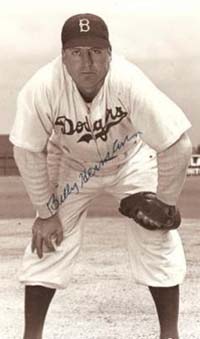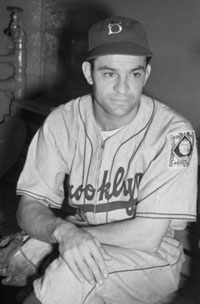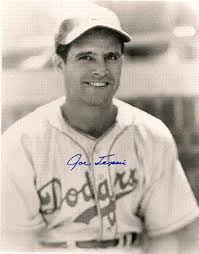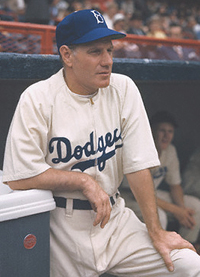The 1946 NL pennant race between the
St. Louis Cardinals and the
Brooklyn Dodgers was the tightest in major league history to that point because it ended in the first-ever tie. The
Cardinals won the best-of-three playoff in two games.
In any season with such a disappointing finish, second-guessing abounds. Many have pointed fingers at Dodger GM Branch Rickey for two transactions he made that season.
June 15
- Rickey traded 3B Billy Herman (a future Hall of Famer) to the Boston Braves for 33-year-old C Stew Hofferth who would never play another game in the majors.
- The trade ostensibly fit Rickey's philosophy of trading a player "a year too early rather than a year too late." Herman would celebrate his 37th birthday on July 10.
- But Billy's stats didn't show a player over the hill. He was hitting .288 with Brooklyn and then raised that to .306 in 75 games with Boston.
- 33-year-old Cookie Lavagetto took Herman's place at the hot corner for the Dodgers but finished the season with a .236 average.
- So what was the real reason Rickey traded Herman? One story claims that the GM got rid of Billy after he refused to pay for damages to his hotel room after a wild party during a road trip. Herman later explained why he refused to reimburse the Dodgers.
I got the blame for it, but I didn't do it. I wasn't even in my room that night. It was my room all right, but I had traded rooms with another player. I won't tell you his name. But I switched rooms with him so he and his buddy, my roommate, could party. I just went up to the other room and slept, and I didn't know anything about it until I checked out the next morning. ... It might well have been the reason Rickey traded me, because Rickey was an idiot about those kinds of things anyway. It was also true that I was making too much money [$20,000] for Rickey to pay. He was a tight, cheap, old bastard. It was all right that he traded me. I didn't care. I got more money with Boston. I just wasn't going to complain and get someone else in trouble.
July 8
- Rickey signed Joe Tepsic, "all-around athletic star at Penn State." Joe played football as well as baseball for the Nittany Lions after recovering from wounds suffered on Guadalcanal. An October 12, 1945 story in the Washington Post on the upcoming Penn State-Navy football game said:
A Jap bayonet ripped Tepsic's arm and shoulder two years ago, but a year of hospitalization, followed by a year of rest and recreation, has enabled the former Marine to stage a brilliant sports comeback.
Last spring, less than a month after his admission to college under the GI Bill of Rights, Tepsic reported for baseball. He showed good form and his .500 batting average attracted the attention of a dozen major league scouts.
- Tepsic did so well on the gridiron in 1945 that the Pittsburgh Steelers made him their fourth round draft pick. He played baseball again in the spring of '46 before signing with the Dodgers.
- The outfielder received $17,000 bonus, a huge amount for that era. Branch explained, "Tepsic has all the physical capabilities that a boy needs to make good in the majors. Unless he shows signs of needing minor-league schooling, he will remain with the Dodgers all season."
- Rickey was disingenuous in that announcement since Tepsic had insisted on a clause in his contract that forbade the Dodgers from sending him to the minors without his consent.
- Manager Leo Durocher didn't seem too pleased to have Tepsic on his roster. Joe appeared in only 15 games the remainder of the season, mostly as a pinch runner. Tepsic batted only five times with no hits.
- Needing every man on the 25-man roster in their battle with the Cards, Tepsic's teammates, with Dixie Walker as their spokesman, tried to persuade the rookie to agree to a demotion to the minors. But Joe was adamant, saying he "would play baseball in the majors or not at all."
- The Dodgers met on September 17 to decide who would get shares of their World Series loot. (In addition to the league champion, the next three teams in the final standings received shares based on their finish. And it was clear Brooklyn would easily make the "first division.") Figuring Tepsic had gotten his bonus when he signed, the players first voted to give him nothing, but Durocher, knowing Joe would appeal to Commissioner Happy Chandler if left out entirely, talked them into a 1/8 share.
- Tepsic's situation was one of the factors that persuaded the owners to pass a rule for the '47 season stipulating that any player given a signing bonus of $6,000 or more could not be sent to the minors without passing through waivers first. The intent of the rule was to discourage teams from paying big bonuses to untried prospects.
- Tepsic went to the minors in '47 and played with various clubs through 1951 without ever playing in another big league game.
Reference:
Rob Neyer's Big Book of Baseball Legends (2008)
Top of Page


